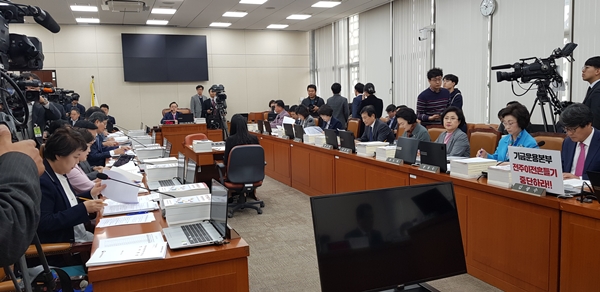Members of the National Assembly’s Health and Welfare Committee criticized the Ministry of Food and Drug Safety (MFDS) for insufficient follow-up measures after the recall of risky hypertension drugs.
Earlier, the government ordered drugmakers to stop selling valsartan medicines that contained N-nitrosodimethylamine (NDMA), a carcinogen. The ministry has completed the rollback of 147 out of the 175 medications on the recall list. The ministry is still recollecting the rest 28 products.

The government is also surveying patients on the use of hypertension drugs and evaluating the impact of the medicines. To prevent carcinogen-containing drugs, the ministry plans to make a list of hazardous substances and set up management standards and test methods.
However, lawmakers said the follow-up measures were not enough.
“The government says they have almost completed the valsartan recall. But there is still a significant danger because NDMA could cause cancer,” said Rep. Yun Il-gyu of the ruling Democratic Party. “We haven’t had a solution about how our society will deal with such harmful medicines, but the ministry seems to lack an idea about follow-up measures.”
In response, Food and Drug Safety Minister Ryu Young-jin said the government would conduct a long-term survey on patients when the results of the impact assessment come out.
Rep. Kim Seung-hee of the opposition Liberty Korea Party attributed the spread of NDMA-containing valsartan drugs to the government’s lax regulation on generic drugs.
“I checked how the ministry was managing the list of generic medicines and found out that the government officials were writing down each drug item by hand,” Kim said.
Although the valsartan debacle revealed the problem of the low entry barriers for generic drugs due to the government’s allowing drugmakers to run bioequivalence tests jointly, the government’s system in generic drug management has not changed at all, she added.
Rep. Jung Choun-sook of the Democratic Party pointed out that she had already urged the MFDS to carry out follow-up measures swiftly. “On July 16, the ministry said it would investigate all the valsartan- and sartan-class medicines but did not do so. In the U.S. and Europe, the authorities are already investigating sartan-class drugs,” Jung said.
She also lambasted the ministry for not starting a probe into drugs containing another carcinogen N-nitrosodiethylamine (NDEA). The U.S. and Europe have begun investigations over NDEA-contaminated medicines.
“It took a month from the recognition of the NDMA problem to the preparation for test methods. The government discovered the NDEA issue in September but is still preparing test methods. This is wrong,” Jung said.
The reason Korea is belatedly responding to hazardous drug substance, compared to other countries including Japan, is that the nation did not sign agreements with health authorities in other countries to keep the matter confidential.
“The European Medicines Agency and Korea’s MFDS have signed only a memorandum of understanding concerning confidentiality. The two are still seeking to have a confidentiality accord,” Jung said. “This is why Korea is lagging behind Japan to respond to drug problems.”
Ryu said it took more-than-expected time to investigate all the 174 valsartan drugs, noting that other countries’ investigations did not involve the full list of the recalled products. “It is not true that the ministry moved and responded slowly,” he emphasized.
Ryu went on to say that the ministry was testing sartan-class medicines as well. “We will announce test methods for sartan drugs by the end of October so that pharmaceutical companies can test them in advance and submit a report,” he added.

